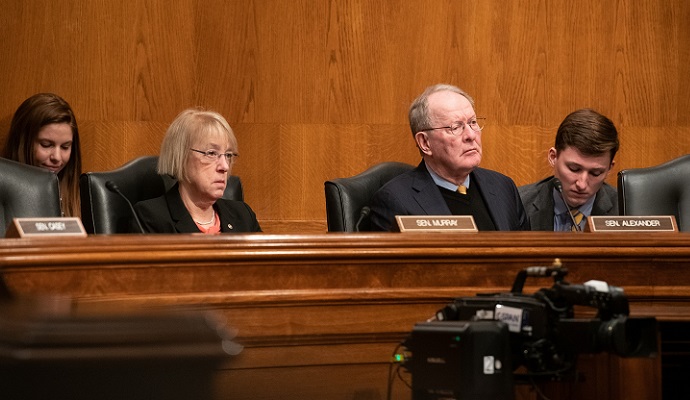HELP Draft Legislation Targets Major Changes in Healthcare Spending
The Senate HELP Committee proposes a plan to rein in healthcare spending with major changes to out-of-network billing, provider-payer contracting, and claims data sharing.

Source: Senate Committee on Health, Education, Labor & Pensions
- Before members of Congress retired for the long weekend, leaders of the Senate Committee on Health, Education, Labor and Pensions (HELP) unveiled draft legislation for the Lower Health Care Costs Act of 2019, an aggressive plan to address to curtail healthcare spending.
Senators Lamar Alexander (R-TN) and Patty Murray (D-WA) praised the bipartisan effort behind their draft legislation to reduce healthcare costs with an eye on the national debate over surprise billing.
“The steps we are taking on important issues like surprise medical billing, drug prices, maternal mortality, and vaccine hesitancy show we can make progress when both sides are at the table ready to put patients and families first,” said Ranking Member Murray.
“We hope to move it through the health committee in June, put it on the Senate floor in July and make it law,” added Chairman Alexander.
The current draft of the Lower Health Care Costs Act comprises five parts, three of which have implications for health payers, especially self-insured employer health plans.
Currently, the architects of the proposed legislation are considering one of three plans for eliminating surprise bills for individuals covered under self-insured employer health plans (which impacts more than 55 percent of workers).
The first plan would mandate that all providers within an in-network hospital bill at the hospital’s rate regardless of the insurance networks that are a part of it. The second would set that price for out-of-network services at the median contracted rate in a given region. And the third would require an independent arbitrator to agree on a final offer for surprise bills exceeding $750 (those under $750 would apply the median rate referenced in the second plan).
The third section of the bills calls for increased transparency into real-world cost data and an end to gag clauses and anti-competitive contract terms in provider-payer contracts.
“You can’t lower health care costs until you know what your health care actually costs,” according to the Senate HELP Committee.
Under the proposed provisions, a designated non-government, non-profit organization would analyze de-identified protected health information and report on the care costs.
The ban on gag clauses and anti-competitive terms is intended to identify business practices that prevent employers and consumers from understanding the financial implications of clinical decision-making that lead to higher costs overall.
Under other provisions, payers would need to supply patients with price quotes for anticipated out-of-pocket expenses as well as the most up-to-date information on providers via directories of in-network healthcare professionals.
The fifth and final section of the draft legislation focuses on patient data access to health information, especially claims information “to help them pick the best health insurance plan for their family, find a provider when they need care, and anticipate what they will pay out of pocket for care.”
Another provision would require the Department of Health & Human Services to comply fully with the interoperability components of the 21st Century Cures Act (which the Senate HELP Committee was instrumental in getting through Congress).
Lastly, healthcare professionals from physicians and hospitals to payers and technology developers must adhere to health data security and privacy set by HHS. Additionally, Congress would investigate how HIPAA protections extend to the use of patient PHI by third-party mobile applications.
“Republicans and Democrats in the United States Senate have announced this proposal of nearly three dozen specific bipartisan provisions that will reduce the cost of what Americans pay for health care. These are common sense steps we can take, and every single one of them has the objective of reducing the health care costs that you pay for out of your own pocket,” said Alexander, for whom this piece of legislation is likely to prove his swan song as he approaches retirement.
